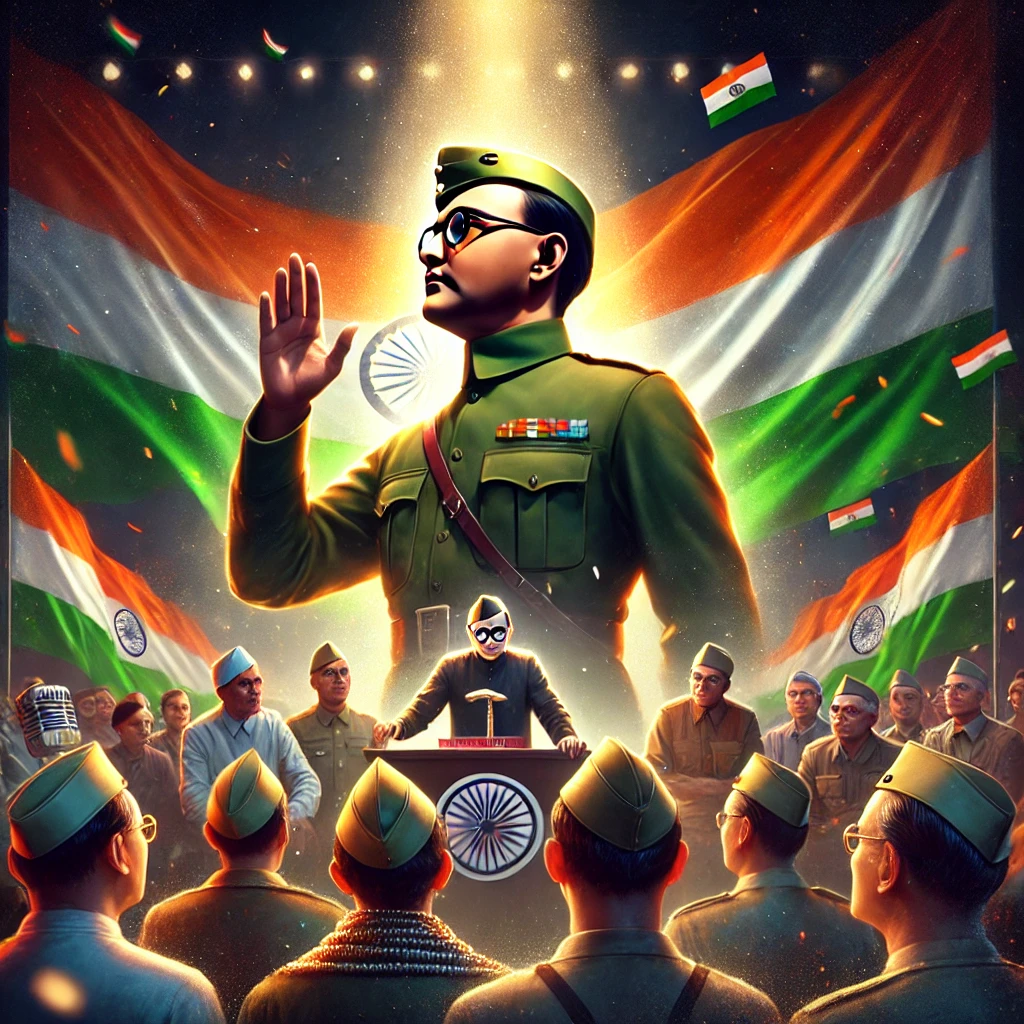The All India Forward Bloc was founded by Subhas Chandra Bose on May 3, 1939, after his resignation from the Indian National Congress (INC). It was established as a radical alternative to the mainstream Congress leadership, advocating complete independence, socialist policies, and armed struggle against British rule. The formation of the Forward Bloc marked a significant shift in India’s independence movement, as Bose sought to unify all progressive and nationalist forces under one banner.
This article delves into the history, ideology, leadership, and contributions of the Forward Bloc in India’s fight for independence.
Historical Background
Bose’s Rise in the Congress and Conflict with Gandhi
Subhas Chandra Bose was an influential leader within the Indian National Congress. He served as the President of the INC in 1938 and was re-elected in 1939. However, his radical views and emphasis on militarization of the freedom movement clashed with Mahatma Gandhi and other Congress leaders, who favored non-violent resistance.
Some key events leading to the formation of the Forward Bloc:
- 1938: Bose’s First Congress Presidency
- As President of the Congress, Bose emphasized industrialization, scientific development, and military preparedness.
- He opposed British policies and demanded Purna Swaraj (Complete Independence).
- As President of the Congress, Bose emphasized industrialization, scientific development, and military preparedness.
- 1939: Second Term and Resignation
- Bose won the Congress presidential election against Pattabhi Sitaramayya, the candidate supported by Gandhi.
- His policies of mass mobilization, socialism, and direct action led to a rift with the Congress leadership.
- Due to opposition from Gandhi and the Working Committee, Bose resigned from the INC and launched the Forward Bloc.
- Bose won the Congress presidential election against Pattabhi Sitaramayya, the candidate supported by Gandhi.
Formation of the Forward Bloc (1939)
The Forward Bloc was formed on May 3, 1939, at Makur Unnao, Uttar Pradesh. It started as a faction within the Congress but later became an independent party.
Objectives of the Forward Bloc
- Immediate and Complete Independence – Bose rejected the idea of dominion status and demanded full freedom.
- Militant Approach – The party believed in mass struggle, aggressive action, and military strength to overthrow British rule.
- Socialist and Pro-Poor Policies – It advocated land reforms, industrialization, and economic equality.
- Unification of Left-Wing Forces – Bose aimed to consolidate all socialist and communist elements in India.
Initial Response and Growth
- The Forward Bloc gained popularity among young revolutionaries, workers, and peasants.
- Bose traveled across India, gathering support from youth organizations, trade unions, and peasant movements.
- The British government, viewing Bose as a serious threat, arrested him in 1940 under the Defense of India Act.
Subhas Chandra Bose’s Escape and Forward Bloc’s Role in the Freedom Struggle
The Escape from India (1941)
- Bose went on a hunger strike in jail and was later placed under house arrest.
- On January 17, 1941, he disguised himself and escaped from Kolkata, traveling through Afghanistan and the Soviet Union to reach Germany.
- He later moved to Japan, where he took control of the Indian National Army (INA).
Forward Bloc’s Activities in India
While Bose was abroad seeking military assistance, the Forward Bloc continued its anti-British activities in India.
- Anti-War Agitation (1940-1942): The party opposed India’s participation in World War II under British rule.
- Quit India Movement (1942): Many Forward Bloc leaders participated in the movement, advocating armed resistance.
- Underground Revolutionary Work: The party worked with other leftist groups and secret organizations to sabotage British rule.
British Repression
- The British banned the Forward Bloc in 1940, calling it a revolutionary and subversive organization.
- Several leaders were arrested or forced into hiding.
- Despite repression, the Forward Bloc remained active in underground resistance.
Ideological Stand of the Forward Bloc
The Forward Bloc was founded on a strong ideological foundation that combined nationalism, socialism, and radical activism.
1. Anti-Imperialism and Armed Resistance
- Bose firmly believed that non-violence alone could not achieve independence.
- He supported mass mobilization and armed struggle to overthrow British rule.
2. Socialism and Economic Policies
- The Forward Bloc advocated land redistribution, state-led industrialization, and social justice.
- Bose envisioned a strong, self-reliant India with a planned economy.
3. Secularism and Unity
- Bose promoted religious harmony and anti-caste policies.
- The party sought to unite Hindus, Muslims, Sikhs, and other communities against colonial rule.
4. Internationalism and Global Alliances
- Bose’s vision extended beyond India—he sought support from Germany, Italy, Japan, and the Soviet Union to fight British imperialism.
Impact and Legacy of the Forward Bloc
Short-Term Impact
- The party played a crucial role in mobilizing leftist groups and challenging British rule.
- It inspired several revolutionary movements and underground networks during the independence struggle.
- Bose’s leadership of the INA (Indian National Army) had a major impact on Britain’s decision to leave India.
Long-Term Influence
- After independence, the Forward Bloc continued as a political party, though its influence declined.
- It remained active in West Bengal, Tamil Nadu, and Bihar, focusing on socialist and workers’ rights.
- The party’s ideology influenced future socialist movements in India.
Bose vs. Gandhi: Contrasting Ideologies
| Aspect | Subhas Chandra Bose (Forward Bloc) | Mahatma Gandhi (Congress) |
|---|---|---|
| Approach to Freedom | Armed struggle, military action | Non-violent resistance |
| Economic Policy | Socialism, industrialization | Village economy, self-reliance |
| International Support | Axis Powers (Germany, Japan) | Allied Powers (Britain, USA) |
| Leadership Style | Strong central authority | Decentralized, democratic |
Conclusion
The formation of the Forward Bloc by Subhas Chandra Bose in 1939 was a turning point in India’s independence struggle. It represented a militant, socialist, and radical alternative to mainstream politics.
Although the party faced British repression and internal challenges, it played a vital role in mobilizing nationalist forces. Bose’s vision of an independent, socialist India remains an inspiration for many even today.
His words, “It is blood alone that can pay the price of freedom. Give me blood, and I will give you freedom,” continue to echo as a call to patriotism and courage.




